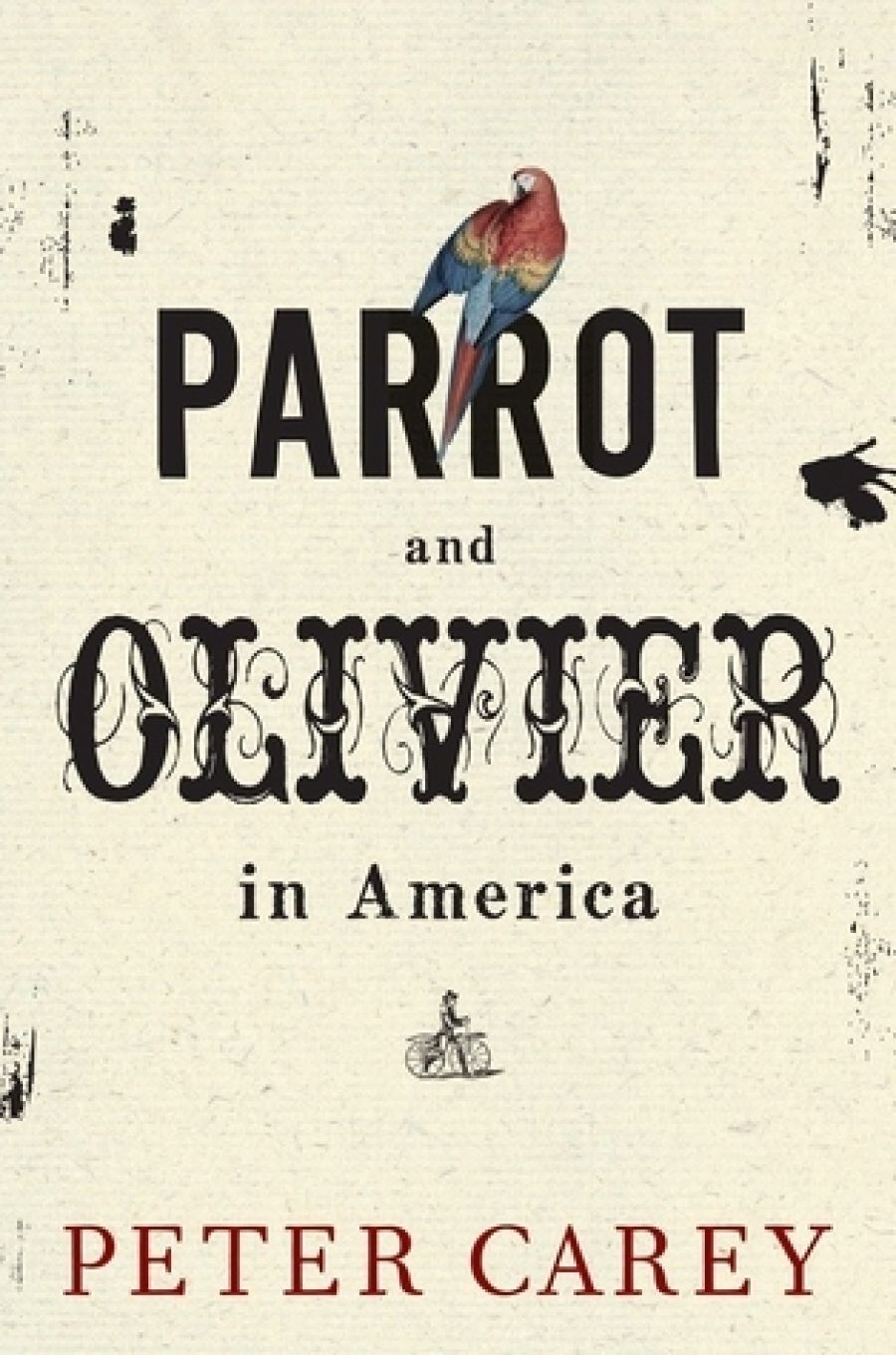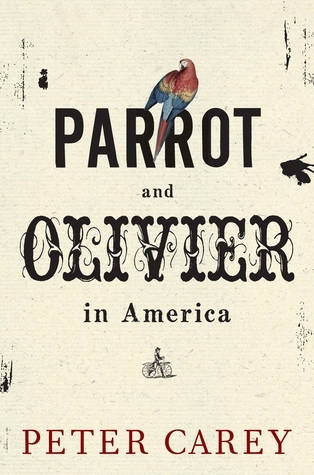
- Free Article: No
- Contents Category: Fiction
- Review Article: Yes
- Article Title: Alchemic brew
- Article Subtitle: A bravura performance from Peter Carey
- Online Only: No
- Custom Highlight Text:
In life and in literature, Peter Carey has been as attracted by the pull of the past as by realities of the present. Then there is his recurrent fascination with the two-country divide, where the lure of exile vies with the sentiment of ‘home’, and the schism between country of choice (or country that ‘chooses’ you) and country of birth means that neither is ever fully suitable.
- Book 1 Title: Parrot and Olivier in America
- Book 1 Biblio: Hamish Hamilton, $49.95 hb, 452 pp
- Book 1 Cover Small (400 x 600):

The winner of two Bookers, three Miles Franklin Awards and two Commonwealth Writers Prizes, Carey is among Australia’s most lauded authors, yet, as he has ruefully noted, such eminence carries its own baggage. His last novel, His Illegal Self (2008), disappointed many, justifiably, with an uncharacteristic paint-by-numbers flatness and an ending that seemed more abandonment than realisation. It followed two others, Theft (2006) and My Life as a Fake (2003), that had managed to divide readers into the enraptured and the underwhelmed.
For all his prizes and international stature, Carey is yet to garner the kind of public affection that Tim Winton and David Malouf enjoy. Carey is a fabulous fabulist of epic intent, but his work is too prickly and irreverent for those who like their menace safe or their expositions worthy. For each Bliss (1981) or Oscar and Lucinda (1988), with their subtle subversions, there has been a corresponding The Tax Inspector (1991) or The Unusual Life of Tristan Smith (1994) or even Illywhacker (1985), whose humour was so black as to verge on the macabre. Carey himself, understandably, has been exasperated by what he sees as nitpicking and a tall-poppy meanness from some critics. He is a risk-taker, with vaulting, poetic ambitions.
This time, however, Carey should have little cause for discombobulation: any suggestion that his literary power might be on the wane is allayed by Parrot and Olivier in America. With his eleventh novel, Carey is back to his True History of the Kelly Gang (2000) best, delivering a bravura performance in which he is high-spirited and mischievous, provocative and wily. A series of adventures and stage-sets, his novel is vastly entertaining.
The unprimed canvas for Carey’s painterly exposition was Alexis de Tocqueville’s Democracy in America, the French noble’s analysis based on his 1831–32 visit to the nascent union. This became both the catalyst for Parrot and, in many ways, an abstract of its intellectual excavation. In the introduction to his work, Tocqueville noted: ‘In America, I saw more than America; I sought the image of democracy itself, with its inclinations, its character, its prejudices and its passions, in order to learn what we have to fear or hope from its progress.’ Carey has taken this as a mission statement, and run with it. This alchemic brew of possibilities and potentials is the medium, but the method is more catholic, satirical and, for all its authentic-seeming lip service to the tongue of the times, retrospective. The twenty-first century New York-based, Australia-imbued Carey takes from Tocqueville and others, but it’s what he makes of his sources, and what he makes up around them, that transforms his novel into a picaresque opus of the magnum variety.
Carey’s Odd Couple pairing of the aristocratic Olivier-Jean-Baptiste de Clarel de Garmont, whose heritage, sensibilities and inbred superiorities make him both an anachronism and a danger to himself in his native land, and the older, self-educated artist-printer John Larrit, a masterly mimic (hence Parrot) whose Dickensian progress from English moor to American amanuensis via the loss of his forger father, transportation to Port Jackson, the interceptions of a mysterious nobleman guardian and a shady French sojourn, is the framework for exploration as he alternates chapters in the men’s contrasting voices.
Within this duet, Carey weaves a swirl of backstories and vibrant secondary characters, some historically edged (an Audubon-like bird painter, for instance), others garish creatures of larger-than-life force. This is a showcase novel of life and love and loss, careering with careless sangfroid from one exposition to the next as it examines ideas and possibilities.
Yet for all its energy, Parrot and Olivier in America is never out of control. Carey knows the sideshows are amusing, but his central act is always the big wheel: the alliance of Olivier and Parrot. Cranky misfits, they are reluctant allies, with Parrot co-opted as an occasional spy reporting back to his master’s mother. The two men gripe and squabble about each other and about the world and their changing place within it from a default position of mutual disdain. This ambivalent master–servant relationship, which mutates as they experience travel and travails together, mirrors the novel’s debate on the nature of democracy as it is being made in America. The cosseted, born-to-rule Olivier, a traumatised survivor whose family has known the terror of Madame Guillotine and mob rule, moves from noblesse oblige to embrace the possibility of democracy; Parrot, who might in a later era have been a devout shop steward, is radicalised into an elemental conservatism that has him welcoming democracy’s probability.
Parrot and Olivier in America is set at the philosophical crossroads where the Old World was colliding with the New (it is no stretch to see intimations of Robert Johnson-like devilish dealings for the social soul). Within the uncertainties of the time lie aspiration and despair, loss and possible rebirth. All is change – inevitable but never comfortable. As Parrot notes,
I suddenly comprehended that the entire house was occupied by people who had occupations suited for the present age. They lived in the New World … I was abandoned to this New World, but I was a habitual servant to a dying breed … I had no art, no trade, no purpose. I had travelled all my life to arrive here, but here was an abyss.
Carey toys with ideas and ideologies, comparing and contrasting post-Bonaparte revolutionary France and the emergence of a rough-edged if resilient democracy in America. In the process, he gives liberté, égalité and fraternité a sly working over. Beyond that, Carey offers an inventive tale of great exuberance that is aware of the paradoxes at its heart, yet remains, for a novel of ideas, paradoxically large-hearted.


Comments powered by CComment